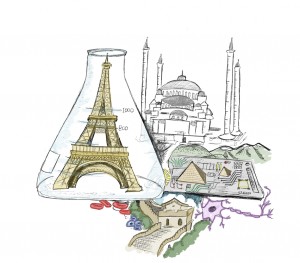I had never believed that it would be possible to study abroad while juggling a challenging premedical track and science major, lab work, and other demands in my schedule. A little over a year ago, while walking through tunnels underneath Lattimore Hall, I did a double-take outside the study abroad office door.
I had always naturally wanted to study abroad, especially because I had never traveled out of the U.S., but the struggle to balance homework and a social life had me deeply discouraged.
“After all,” I thought, “study abroad is designed for those in Business or international relations.
After about five minutes of looking at pictures of smiling students and exotic locales, I figured it wouldn’t hurt to stop in and say hello.
After having spent the last semester abroad in Dublin, I would not have wanted that day to end any other way. Students agreed — the opportunity to live, study, and overall experience life abroad is absolutely priceless.
Even the numbers of science and engineering students studying abroad has increased dramatically over the past few years, and many graduate and medical schools view the experience as positive.
“Many exchange programs are particularly relevant to the academic needs of science and engineering students,” Assistant Dean and Director for the Center of Study Abroad Jacqueline Levine said. “A few exchange program highlights are the Australian National University, Uppsala University, and the Hong Kong University of Science and Technology.”
Junior Nicholas Giangreco has pursued one such program and is currently studying at Uppsala University in Sweden. He is actively working with Professor of Biology David van der Spoel, on a project to predict the multi-domain structure of protein A in solution as part of a project work in Biology course.
“These courses not only transfer to UR as biology electives, but they also [give] me experience and knowledge in the field of research I want to establish a career in: computational biology,” Giangreco said.
Senior Spencer Kingsbury spent last spring abroad in Auckland, New Zealand while pursuing a degree in chemical engineering.
“Although the subject matter was the same, classes are taught radically differently, and students are expected to be much more self-driven and self-taught,” Kingsbury said.
Despite it being uncommon for engineers to study abroad, a friend convinced Kingsbury to apply, which ended up “being relatively easy to set-up.”
Beyond Kingsbury’s amazing academic experience, he explained that the best part about studying abroad is being able to travel and experience different things.
“I took advantage of it best I could: I traveled whenever I had an opportunity and made conversation with the locals much more than I would here in New York. It was a very rewarding experience,” he said.
Senior Joy Jiang, a mechanical engineer who has studied abroad in Israel, shared with me details about her own “life-changing” experience. At the Techion Israeli Institute of Technology, Joy took two engineering courses to fulfill UR requirements.
With careful planning, Joy’s academic schedule is mostly unaffected with the exception of having to take two lab courses in one semester — something she explains is well worth the trouble.
Beyond her studies in science and technology, Joy had the experience of learning a new language for the first time as part of a Hebrew class taken prior to the start of term. She especially enjoyed the opportunity to interact with a more diverse student body, including students “from Nepal, Singapore, [and] European countries.”
Many students worry abou how they will afford their abroad experience; however, Levine cleared up this misconception.
“For semesters and academic year programs abroad, all UR aid (merit and need-based) transfers toward the study abroad program. In addition, there are many scholarships that students can apply for, the newest being a $2,000 grant toward the cost of any UR exchange program,” she explained.
Personally, a generous scholarship from the Gilman Foundation supported my study abroad program. I used the scholarship to cover travel to and from the US and meal expenses during my term in Ireland, alleviating financial burden on my family and myself. International Education of Students, the agency through which some UR sponsored programs run through, also offers both need and merit-based awards. Time abroad is not where the benefits and experiences end. There are lasting memories, lessons, friends, and an opportunity for expanded exeriences abroad in the future.
It does take some planning, but if you want to have the experience of a lifetime while still maintaining your focus on building career-relevant experience, the world is yours.
Kennedy is a member of the class of 2014.





